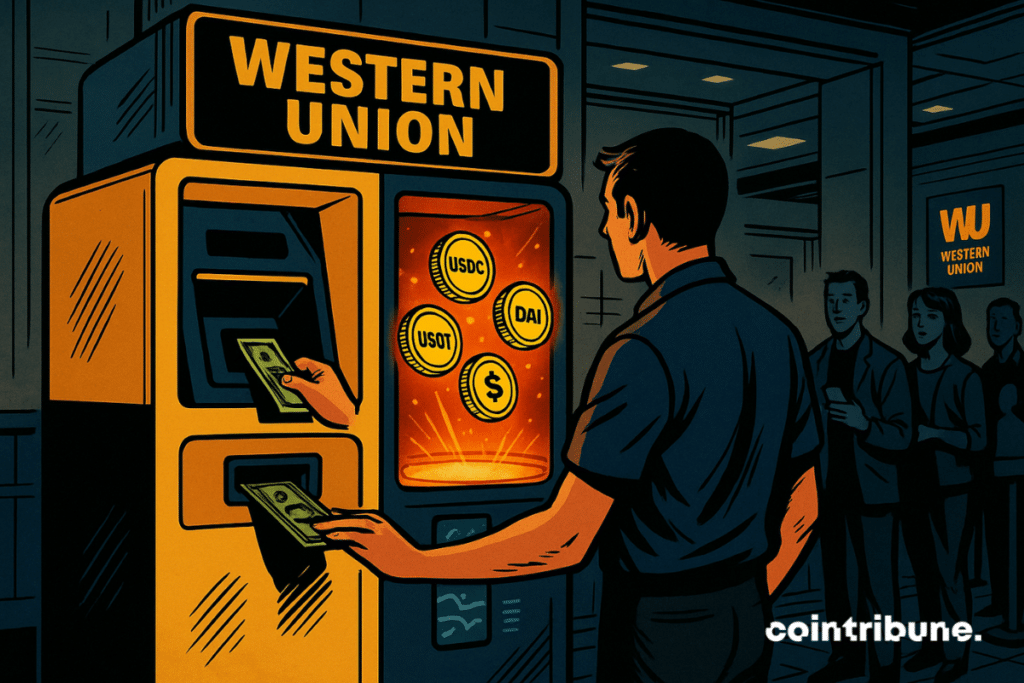Western Union Modernizes Payment System With Stablecoins
Facing the rise of crypto solutions, Western Union is undergoing a major transformation. The company is piloting the use of stablecoins for its cross-border settlements. Present in more than 200 countries, it aims to modernize its financial flows for 150 million customers. This shift, far from symbolic, reveals a clear desire to adapt to a new era where speed, cost reduction, and decentralized infrastructures redefine the standards of international transfers.

In brief
- Western Union launches a pilot project integrating stablecoins to modernize its cross-border settlements.
- The goal is to reduce costs, speed up transfer times, and bypass traditional banking systems.
- This strategic shift comes as the company handles nearly 70 million transactions each quarter.
- CEO Devin McGranahan highlights gains in transparency, capital, and efficiency thanks to blockchain technology.
Western Union bets on blockchain to modernize its settlements
During the third quarter earnings call, Western Union CEO Devin McGranahan announced the launch of a pilot project based on the use of stablecoins to perform cross-border settlements, after tests were conducted in July.
“The project focuses on leveraging on-chain settlement rails to reduce reliance on traditional banking systems, shorten settlement times, and improve capital efficiency,” he stated.
He also emphasized that this approach fits into a desire to offer faster, more transparent, and lower-cost transfers without compromising compliance or customer trust.
Specifically, the company seeks to leverage the advantages offered by blockchain technology in its internal processes. Each quarter, Western Union processes about 70 million transactions across more than 200 countries. Integrating settlements in stablecoins would allow bypassing the burdens of the traditional banking system, especially correspondent banking, by relying on :
- A significant reduction in settlement times, which today can extend over several days through classic channels ;
- Greater transparency in tracking transfers, thanks to the native traceability of on-chain transactions ;
- Improved capital efficiency, with less need for locked-up liquidity in various countries ;
- Lower operational costs by removing some intermediaries and processing fees.
This initiative reflects a clear will to modernize Western Union’s settlement infrastructure, aligning it with emerging technological standards while maintaining regulatory compliance requirements.
A response to new economic challenges
Beyond the technical aspects of the pilot project, Western Union stresses the impact this new offering could have in geographic areas weakened by monetary instability.
On-chain data reveals that in many regions of the world, the ability to hold a US dollar-denominated asset has real value, as inflation and monetary devaluation can quickly erode purchasing power. This strategic choice therefore seems aimed at an underbanked population seeking stable alternatives to store and transfer value.
This announcement comes only a few months after the passage of the GENIUS Act in the United States, a law that lifted some regulatory barriers related to crypto use. This legislative change cleared Western Union’s doubts about crypto volatility and non-compliance risks, paving the way for a first concrete implementation of stablecoins in its business processes.
Moreover, this decision occurs as competing players such as Zelle or MoneyGram are also advancing their pieces in the digital dollar field, whether via Circle’s USDC or other stable assets.
Such an evolution could ultimately redefine the landscape of international transfers, particularly to emerging markets where populations are often excluded from traditional banking channels. By reducing costs, speeding up transactions, and aligning with new user expectations, Western Union is beginning a transition that could eventually disrupt current norms. Institutional adoption of stablecoins, once viewed with caution or suspicion, now imposes itself as an essential strategic lever in the modernization of global financial services.
Maximize your Cointribune experience with our "Read to Earn" program! For every article you read, earn points and access exclusive rewards. Sign up now and start earning benefits.
Diplômé de Sciences Po Toulouse et titulaire d'une certification consultant blockchain délivrée par Alyra, j'ai rejoint l'aventure Cointribune en 2019. Convaincu du potentiel de la blockchain pour transformer de nombreux secteurs de l'économie, j'ai pris l'engagement de sensibiliser et d'informer le grand public sur cet écosystème en constante évolution. Mon objectif est de permettre à chacun de mieux comprendre la blockchain et de saisir les opportunités qu'elle offre. Je m'efforce chaque jour de fournir une analyse objective de l'actualité, de décrypter les tendances du marché, de relayer les dernières innovations technologiques et de mettre en perspective les enjeux économiques et sociétaux de cette révolution en marche.
The views, thoughts, and opinions expressed in this article belong solely to the author, and should not be taken as investment advice. Do your own research before taking any investment decisions.